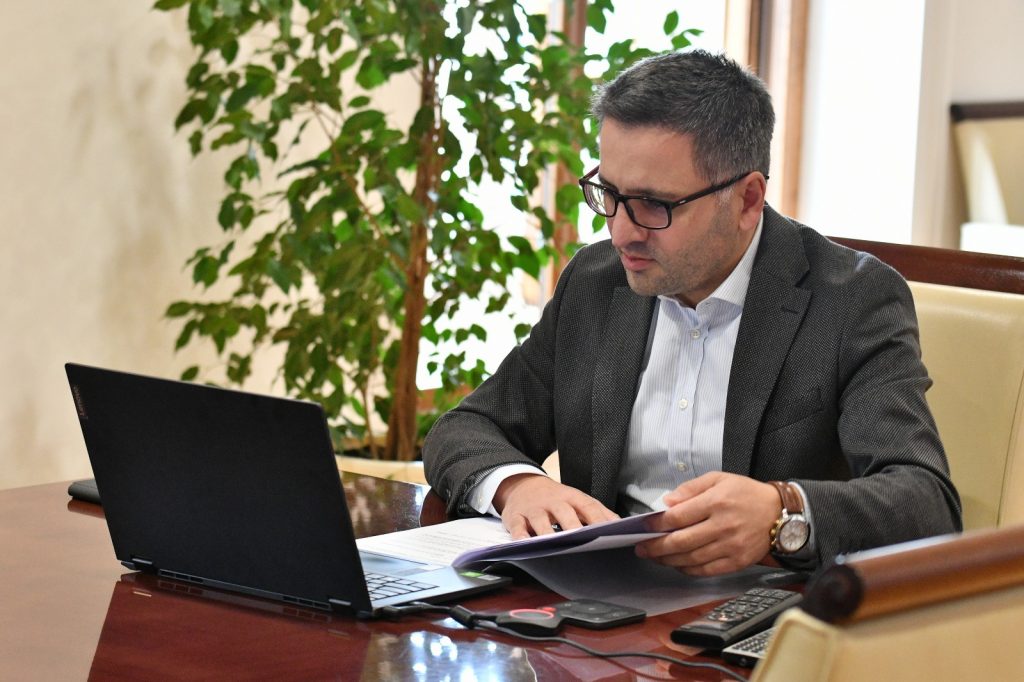13th May 2022, Skopje – Ministry of Finance continues realizing the activities for developing the public financial management system. First Public Financial Management Reform Program was adopted four years ago, while policy dialogue about the new Draft Program was held today, together with all relevant partners – EU, international institutions, such as IMF, World Bank, UNDP and others, USAID, embassies, civil society organizations, academia. Public Financial Management Reform Program is a strategic document aimed at developing the public financial management system. Reforms were launched in the previous 4-year period (2018-2022), while the new Draft Program ensures the continuation of the reforms in this field.

“Public finance management is a challenge in particular in times of turbulent economic environment imposed by the COVID-19 pandemic which emerged in 2020, causing not only a health, but also a socio-economic crisis, being additionally exacerbated by the energy crisis and the ongoing war in Ukraine, derailing almost all economies from their pre-crisis growth trajectory. Need to undertake economic measures caused for government expenditures to increase due to the expansionary fiscal policy, postponing the medium-term framework for the projected fiscal targets, with budget deficits and public debt increase. All this highlights the importance of public finance sustainability, thus urging the need to balance the short-term stabilization objectives and the need for long-term fiscal sustainability by rationalizing public expenditures in the medium term, as well as measuring the results from expenditure execution to the end of increasing spending efficiency and reaching fiscal sustainability in the medium term, Minister Besimi said at today’s meeting.
He underlined that further improvement of public financial management is necessary not only to underpin the measures aimed at fiscal consolidation and structural reforms, but also as a process which improves the quality of the public administration and ensures an attractive and desired environment for the investors.
Program is based on SMART public finance concept or if translated literally “smart” finances, which will be based on a clear strategy and, which is to be sustainable, accountable, reform-oriented and transparent, under which the necessary public finance-related reforms will be implemented, in terms of long-term and better-quality planning of budget programs and budgets, being thereby continuous, i.e. sustainable, thus providing for increasing the transparency on continuous basis. From the point of view of economic philosophy or political economy, this will mean aiming at more just model of public finances from the point of view of revenues, expenditures and the manner of financing, i.e. in other words, how the funds are collected in the Budget and how citizens’ money is spent. The focus is put on re-orienting the traditional budgeting to performance-based budgeting and introducing multi-annual budget framework.
By indicating that public finance transparency and accountability must be one of the main pillars of the SMART system, Minister pointed out that transparency was the “key word” in the politics over the past years. Its real value for public finances is that it is the highest level of fiscal control, whereby you provide information to the public in a simple and understandable manner – the public judges and decides whether it is a right or justified or legal decision.
Public finance reforms aimed at improved fiscal framework, strengthened process of public finance planning, execution and reporting, increased revenue collection, strengthened public procurement system and improved internal and external control by increasing transparency and accountability in operations, are identified as one of the key goals of the Government, which is to ensure accelerated and sustainable economic growth, higher living standard and better quality of life for the citizens. All this encompasses maintaining stable budget in the long run, thereby continuing the rendering of quality and prompt services to the citizens and the businesses through a modern and efficient public administration based on digitalization.
New Program, incorporating 8 pillars with 22 priorities, results from the hard work by the relevant institutions, pertaining to the public financial management system over the last 6 months, a process coordinated by the Ministry of Finance, in cooperation with PRO, Customs Administration, Public Procurement Bureau, State Appeals Commission, Ministry of Economy and State Audit Office, and supported by SIGMA.
















